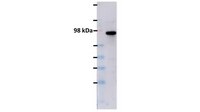A Mild PUM1 Mutation Is Associated with Adult-Onset Ataxia, whereas Haploinsufficiency Causes Developmental Delay and Seizures.
Gennarino VA, Palmer EE, McDonell LM, Wang L, Adamski CJ, Koire A, See L, Chen CA, Schaaf CP, Rosenfeld JA, Panzer JA, Moog U, Hao S, Bye A, Kirk EP, Stankiewicz P, Breman AM, McBride A, Kandula T, Dubbs HA, Macintosh R, Cardamone M, et al.
Cell
172(5)
924-936
2018
显示摘要
Certain mutations can cause proteins to accumulate in neurons, leading to neurodegeneration. We recently showed, however, that upregulation of a wild-type protein, Ataxin1, caused by haploinsufficiency of its repressor, the RNA-binding protein Pumilio1 (PUM1), also causes neurodegeneration in mice. We therefore searched for human patients with PUM1 mutations. We identified eleven individuals with either PUM1 deletions or de novo missense variants who suffer a developmental syndrome (Pumilio1-associated developmental disability, ataxia, and seizure; PADDAS). We also identified a milder missense mutation in a family with adult-onset ataxia with incomplete penetrance (Pumilio1-related cerebellar ataxia, PRCA). Studies in patient-derived cells revealed that the missense mutations reduced PUM1 protein levels by ∼25% in the adult-onset cases and by ∼50% in the infantile-onset cases; levels of known PUM1 targets increased accordingly. Changes in protein levels thus track with phenotypic severity, and identifying posttranscriptional modulators of protein expression should identify new candidate disease genes. | 29474920
 |








